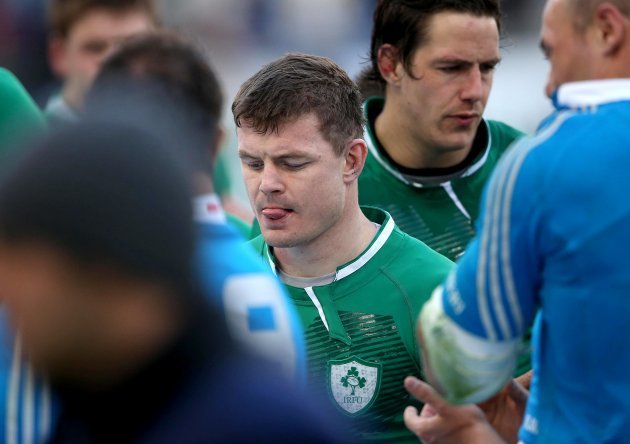Reproduced with permission from WhiffofCordite
WE SAID BEFORE the tournament that four wins would constitute a good year, with three the minimum requirement. In the event, Ireland finished well below that watermark, with one win and one draw.
That the win was against the eventual champions was scant consolation, and we can be thankful we didn’t meet the confident incisive Welsh of Week Five, instead the cowed losers of Week One.
The final indignity was the tactical ineptitude of Rome where Plan A – box-kicking until the cows come home – was dealt with with ease by the Azzurri, then Plan B – errrrr, kicking them? – didn’t work either, and their forwards pummelled us to win with ease. A fair reflection of the dominance of the Italian pack would have been a 20-point margin. In the event, the inability of the Italians to press home their advantage, and their inability to stop throwing the ball forward spared us the shame of finishing last, but no-one will be boasting about that.
For sure, unavailability of certain players played apart — the lineout was shambolic in Paul O’Connell’s absence, and the tendency of our forwards to powder-puffery would surely have been dealt with by Fez. Likewise, having Johnny Sexton in Murrayfield might have made the difference. It’s hard to think of any Irish player who will feel he can be satisfied with his overall contribution. Some of the players playing their first tournament, particularly Luke Marshall and Iain Henderson, will be proud of themselves as well.
Rabble
The indisciplined and brainless rabble who finished the championship are far from where they should be given the on-field and off-field resources available to this side — the team in Rome looked essentially uncoached, and it’s quite clear a new broom is sorely needed. The prospect of promoting Les Kiss or Anthony Foley from within looks wildly misjudged.
Surely a new set of voices, untainted by the recent spirit-crushing shambles, with fresh ideas and a different mindset are required? The line being peddled by Kidney’s apologists, that the current management have ‘valuable corporate knowledge’ that shouldn’t be thrown out is laughable. What value is corporate knowledge when you keep losing?
Indeed, the very lack of preconceptions for a new coach coming in sounds much more appealing.
The player management system would appear to have reached the end of its current life cycle as well – Johnny Sexton bemoaned the lack of rugby he could play earlier in the year due to its strictures, and the spate of injuries surely speaks to some level of sub-optimal conditioning. While some degree of control over player game-time is desirable, the strings need to be loosened significantly. At the very least a review of this is required, with a view to understanding whether the players gain anything a t all from playing so little.
Likewise, the central contracting system is just unclear and divisive – criteria are muddled, and a broader view is needed in this, the 18th season of professional rugby. We know as little as everybody else as to how these contracts are given out. The system was perfect to entice English-based players home in the late 1990s, and protect what was then a handful of international class players, but something more malleable is needed now.
The situation where the IRFU are negotiating with an injured player – recently the case with Ferris, Fitzgerald and some time ago with Denis Leamy – is only going to become more commonplace, and a more flexible system is needed to accommodate this. It cannot be that players recovering from serious injury are just cut loose from the system, although some levity is required here too, and the IRFU has a responsibility to manage its finances correctly.
Speaking of English-based players in the late 1990s, the last defeat to Italy, as we outlined here, was something of a watershed in Irish rugby, and contributed the IRFU to be pro-active about professionalism – here’s hoping this one can turn out to be a turning point as well, and be the catalyst to moving Irish rugby’s governance and structures in line with best professional practice.
We could do a lot worse than copying the system in New Zealand – we may not have the history and strength in depth they have, but their structures produce success at all levels (underage, Super Rugby, international) and they want to be the best they can at all times. We should as well.


